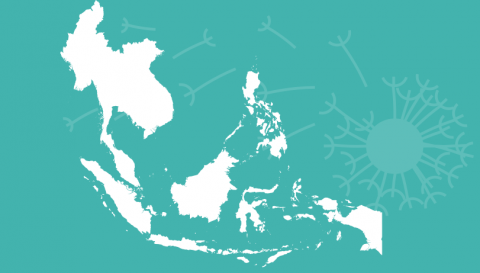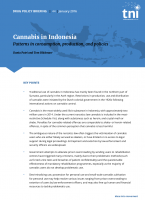Lessons from the Southeast Asian Advocacy Fellowship Programme on Drug Policy Reform A Priceless Opportunity to Learn about Drug Policy in the Netherlands
Temas
Regiones
Fecha de publicación:
Between 10 and 25 June 2017, the Transnational Institute organised a Southeast Asian advocacy fellowship programme on drug policy reform, attended by seven participants from Thailand, Cambodia, the Philippines, Indonesia, and Myanmar. One of the participants, Viona Wijaya from Indonesia, shares her experiences in this article.

By Viona Wijaya
It was a priceless experience for me to join the Advocacy Fellowship Program on Drug Policy Reform in Amsterdam, held by the Transnational Institute. The program which lasted from 10 to 24 June 2017, was attended by seven participants from different countries in South East Asia Region. It aimed to give us an opportunity to discuss and learn about the development of Drug Policy around the world, and particularly in Netherlands.
Diverse topics related to drug policy issues were covered and discussed intensively such as the history of drug policy development in the Netherlands and the world, current development of drug trafficking as transnational crime, and various approaches used by the Dutch government to deal with drug-related issues. The most notable thing about this program is that it also gave us the opportunity to visit various places to learn about the implementation of policies in reality. We visited museums, universities, government agencies, a users’ organization, a drug consumption room, coffeeshops, festivals, and many more, which allowed us to have direct encounters with the stakeholders and the most affected groups. Not only that, we also had very intensive and attractive communication training sessions which enlightened us to be able to communicate our ideas, especially in drug policy issues, effectively.
Due to the limited number of participants, almost all of these activities were followed by in-depth and lively discussions between the participants. Sometimes, the discussions lasted into the night, when we already came back to our flats. Sharing a pretty much similar situation and challenge in our home countries, it was really enjoyable to learn and exchange thoughts with other participants.
Generally speaking, drug policy in South East Asian countries tends to use repressive approaches, stressing criminalization and heavy penalty provisions for their deterrent effect to the people. In Indonesia, for instance, one can go to prison if caught possessing a drug. The Philippines may be on the country experiencing the harshest time, where extrajudicial killing of people suspected as drug dealers are allowed.
Coming from that background, it was really interesting and also inspiring to learn that there’s actually a lot of alternative approaches outside of what we have in our country. The Dutch government, for example, treat drug issues as public health issues. Instead of stressing criminalization or heavy punishment, the government focus their energy, funds, and policy on preventive means such as socialization, demand reduction, and harm reduction programs. Combined with other treatments proportionally, over time, these policies have been proven effective to reduce the number of problematic users and victims of irresponsible drug use.
Every country has its own context, meaning that not every policy that has successfully been implemented in one country can be adopted wholly in another country. In Indonesia, for instance, some particular attributes such as geographical position, demographic, religious culture, poverty, and high disparity in the society are things that make it different from western countries, and therefore should be considered and addressed in forming its public policy.
However, lessons and inspirations can always be found in the experiences of other countries – and this program has given us the chance to explore that. As for me, the most inspiring thing learned from the Netherlands’ experience is the seriousness and consistency of the government in developing its policy based on research and evidence. Continuous research and evaluation are being carried out since the 1970s to make sure there is an effective and relevant drug policy at all times. Even now, the Dutch government are still working hard to keep their policy updated with recent development such as the emergence of new addictive substances.
Coming back to my home country, I realize that there is still so much work to be done. Having learned so many things from TNI’s Advocacy Fellowship Program on Drug Policy Reform, I hope that I will be able to contribute in making a better drug policy in Indonesia.
